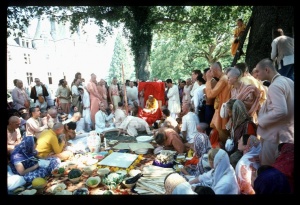CC Madhya 24.128: Difference between revisions
m (1 revision(s)) |
No edit summary |
||
| Line 1: | Line 1: | ||
{{ | [[Category:Sri Caitanya-caritamrta - Madhya-lila Chapter 24|C128]] | ||
<div style="float:left">'''[[Sri Caitanya-caritamrta|Śrī Caitanya-caritāmṛta]] - [[CC Madhya|Madhya-līlā]] - [[CC Madhya 24|Chapter 24: The Sixty-One Explanations of the Atmārāma Verse]]'''</div> | |||
<div style="float:right">[[File:Go-previous.png|link=CC Madhya 24.127|Madhya-līlā 24.127]] '''[[CC Madhya 24.127|Madhya-līlā 24.127]] - [[CC Madhya 24.129|Madhya-līlā 24.129]]''' [[File:Go-next.png|link=CC Madhya 24.129|Madhya-līlā 24.129]]</div> | |||
{{CompareVersions|CC|Madhya 24.128|CC 1975|CC 1996}} | |||
{{RandomImage}} | |||
==== TEXT 128 ==== | ==== TEXT 128 ==== | ||
<div | <div class="verse"> | ||
asmin sukha-ghana-mūrtau | :asmin sukha-ghana-mūrtau | ||
param-ātmani vṛṣṇi-pattane sphurati | :param-ātmani vṛṣṇi-pattane sphurati | ||
ātmārāmatayā me | :ātmārāmatayā me | ||
vṛthā gato bata ciraṁ kālaḥ | :vṛthā gato bata ciraṁ kālaḥ | ||
</div> | </div> | ||
| Line 14: | Line 18: | ||
==== SYNONYMS ==== | ==== SYNONYMS ==== | ||
<div | <div class="synonyms"> | ||
''asmin''—when this; ''sukha-ghana-mūrtau''—form of complete happiness; ''parama-ātmani''—the Supreme Person; ''vṛṣṇi-pattane''—in Dvārakā-dhāma; ''sphurati''—exists; ''ātmārāmatayā''—by the process of cultivating Brahman realization; ''me''—my; ''vṛthā''—uselessly; ''gataḥ''—wasted; ''bata''—alas, what can I say; ''ciram''—for a long time; ''kālaḥ''—time. | |||
</div> | </div> | ||
| Line 21: | Line 25: | ||
==== TRANSLATION ==== | ==== TRANSLATION ==== | ||
<div | <div class="translation"> | ||
"'In this Dvārakā-dhāma, I am being attracted by the Supreme Personality of Godhead, Kṛṣṇa, who is personified spiritual bliss. Simply by seeing Him, I am feeling great happiness. Oh, I have wasted so much time trying to become self-realized through impersonal cultivation. This is a cause for lamentation!' | |||
</div> | </div> | ||
| Line 28: | Line 32: | ||
==== PURPORT ==== | ==== PURPORT ==== | ||
<div | <div class="purport"> | ||
This verse is found in the Bhakti-rasāmṛta-sindhu (3.1.34). | This verse is found in the ''Bhakti-rasāmṛta-sindhu'' (3.1.34). | ||
</div> | </div> | ||
__NOTOC__ | |||
<div style="float:right; clear:both;">[[File:Go-previous.png|link=CC Madhya 24.127|Madhya-līlā 24.127]] '''[[CC Madhya 24.127|Madhya-līlā 24.127]] - [[CC Madhya 24.129|Madhya-līlā 24.129]]''' [[File:Go-next.png|link=CC Madhya 24.129|Madhya-līlā 24.129]]</div> | |||
__NOTOC__ | |||
__NOEDITSECTION__ | |||
Revision as of 10:17, 14 September 2021

A.C. Bhaktivedanta Swami Prabhupada
TEXT 128
- asmin sukha-ghana-mūrtau
- param-ātmani vṛṣṇi-pattane sphurati
- ātmārāmatayā me
- vṛthā gato bata ciraṁ kālaḥ
SYNONYMS
asmin—when this; sukha-ghana-mūrtau—form of complete happiness; parama-ātmani—the Supreme Person; vṛṣṇi-pattane—in Dvārakā-dhāma; sphurati—exists; ātmārāmatayā—by the process of cultivating Brahman realization; me—my; vṛthā—uselessly; gataḥ—wasted; bata—alas, what can I say; ciram—for a long time; kālaḥ—time.
TRANSLATION
"'In this Dvārakā-dhāma, I am being attracted by the Supreme Personality of Godhead, Kṛṣṇa, who is personified spiritual bliss. Simply by seeing Him, I am feeling great happiness. Oh, I have wasted so much time trying to become self-realized through impersonal cultivation. This is a cause for lamentation!'
PURPORT
This verse is found in the Bhakti-rasāmṛta-sindhu (3.1.34).